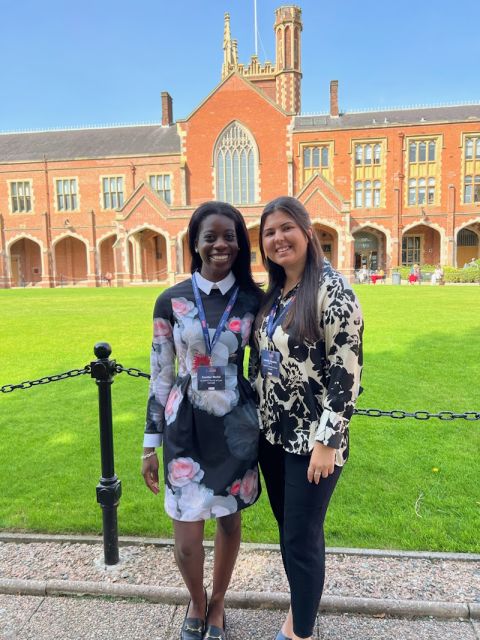
When Law’23 classmates Isabelle Nazarian and Caroline Marful strolled into a classroom at the School of Law at Queen’s University Belfast for a session of this year’s annual conference of the University Association for Contemporary European Studies (UACES), no one gave them a second glance. However, all that changed when the two sat down at the presenter’s table.
Nazarian, who hails from Brampton, and Marful from Mississauga, took part in a roundtable that brought together academic experts and policy-makers for a discussion of the merits of climate-change-related trade-policy instruments. The principles of international law that are involved are as complex as they are vital in our fast-changing world. Nazarian and Marful offered up for discussion a compendium of legal arguments they outlined in a jointly-authored study they titled “Impact of Border Carbon Adjustments [BCAs] on Least Developed Countries [LDCs].”
“We were the youngest of the [four] presenters at the session,” Marful says. “And as far as I know, we were the only JD students to present a paper at the UACES conference.”
Their paper was the product of two years of course work Nazarian and Marful had done at Queen’s Law.
“Caroline and I both took an International Trade Law Practicum with Professor Nicolas Lamp,” says Nazarian. “For that, we were in touch with some foreign governments, and basically our deliverable was to research BCAs and to help these countries to design ones they can implement themselves. We were involved in a group-research project that was about 90 pages long. From that point on, because we were doing this research and enjoying it, Professor Lamp asked us to present our findings at a Canadian Council on International Law conference that was held in Ottawa last October.
After that, both Nazarian and Marful continued thinking and writing about many of the same issues in their other classes at Queen’s Law. It was because Professor Lamp saw the quality of their scholarship and their sustained enthusiasm that he urged the pair to apply to be included among the presenters at the 2023 UACES conference. When they did so and their proposal was accepted, it would be an understatement to say that they were surprised (and delighted). After all, it’s not often that JD students are invited to present an academic paper they’ve written at a prestigious international legal conference. That Nazarian and Marful were is testament to the excellence of the research being done by Queen’s Law students.
“To clarify: our presentation in Belfast wasn’t about one specific paper. It was more about a collection of research we’ve done over the course of a couple of years,” Marful explains.
As you’d expect, Nazarian and Marful initially felt a tad intimidated when they began offering up their ideas before an audience made up of legal scholars and officials from governments and NGOs, all of whom had expertise and hands-on experience in the issues that are integral to trade and climate change.
Says Nazarian, “At its simplest, our general argument is that it’s the LDCs that are being left out of the conversation, but it’s LDCs that will be most heavily impacted because historically they haven’t been able to reduce their carbon emissions. Once these BCAs come into play, if the LDCs don’t find a way to keep up, they’re going to be left out or even behind in international trade.”
It’s clear that notion is one that resonated with Nazarian and Marful’s audience in Belfast. The post-presentation question-and-answer session was as lively as it was productive.
“While we approached our topic from an academic viewpoint, many of the people in the room had a hands-on, working perspective of the issues. It was really interesting to hear what they had to say,” says Marful.
Both she and Nazarian say they hope to continue developing the arguments they put forward in their paper and will refine and add to them going forward. But for now that will have to wait. The two young Queen’s Law grads are preoccupied with articling.
Nazarian is working at the Toronto-based law firm Loopstra Nixon LLP, while Marful also is in Toronto with Torys LLP.
“As I’m sure you can imagine, we’re both pretty busy these days. But I’m hoping that when I complete my articles I’ll have some time to work with Isabelle to revisit our article, to do some more work on it, and perhaps get it published.”
By Ken Cuthbertson, Law’83